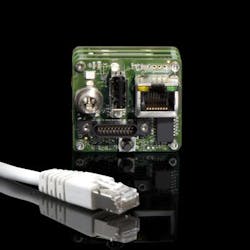Smart cameras from VRmagic come equipped with Ethernet interface
With a standard Debian Linux operating system and full access to the ARM9/DSP DaVinci processor from Texas Instruments, a line of smart cameras has been updated with an Ethernet interface to receive application software and firmware updates. Algorithms can be developed with standard environments such as Visual Studio or Code Composer Studio and transferred to the camera via cross-compilers. The host system and camera have the same application programming interface (API). The components are equipped with 256 Mbytes of RAM and a 512-Mbyte flash module. Additional interfaces include USB 2.0 Host, RS-232 and GPIO, and Analog Video Output, as well as optionally digital video output and audio interface. Designs range from cameras in housings and PCB cameras to OEM designs with up to four pixel-synchronous remote sensors.
VRmagic
Mannheim, Germany
-- Posted by Vision Systems Design
View More Vision+Automation Products
Locate a vendor or system integrator in our Online Buyer's Guide
---
NEW PRODUCT PRESS RELEASE
Ethernet update for intelligent cameras
Mannheim -- Application software and firmware updates are now possible via the Ethernet interface for the programmable intelligent cameras from the camera manufacturer VRmagic.
“Up to now, VRmagic has provided its customers with a rescue USB stick for convenient and inexpensive maintenance of OEM applications in the field. In installation situations where access to the USB port is either not possible or difficult, the current software version and complete camera firmware can now be transferred to the camera just as easily and reliably via Ethernet,” explains Oliver Menken, Sales and Marketing Manager at VRmagic. “This means that application maintenance is also possible via a network connection.”
With a standard Debian Linux operating system and full access to the ARM9/DSP DaVinci processor from Texas Instruments, the intelligent cameras from VRmagic provide developers with a convenient platform for programming their own applications. Algorithms can be developed with standard environments such as Visual Studio or Code Composer Studio and transferred to the camera by means of cross-compilers. The host system and camera have the same API. The components are equipped with 256 MB RAM and a 512 MB flash module. The supported interfaces include Ethernet, USB 2.0 Host, RS232 and General Purpose I/O, Analog Video Output as well as optionally digital video output and audio interface. Available designs range from cameras in housings and PCB cameras through to special OEM designs with up to four pixel-synchronous remote sensors.
About VRmagic
Founded in 2001 and headquartered in Mannheim, Germany, VRmagic develops, manufactures and sells cameras for industrial image processing, optical tracking systems and VR technology. A second business division specializes in simulators for medical training.
VRmagic Holding AG
Augustaanlage 32
68165 Mannheim
Germany
SOURCE: VRmagic
